Gertrud Kückelmann (1929-1979) was a German stage and film actress and was the German voice for Shirley MacLaine and other Hollywood stars.
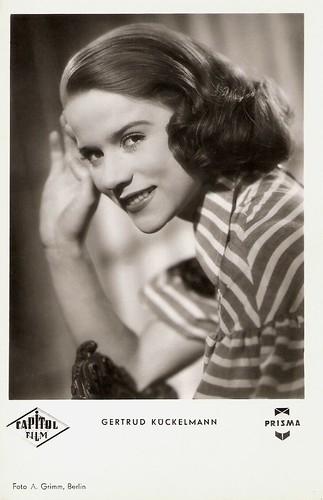
German postcard by Kunst und Bild, Berlin, no. A 798. Photo: Capitol Film / Prisma / Arthur Grimm. Publicity still for Die Stärkere/The Stronger (Wolfgang Liebeneiner, 1953).
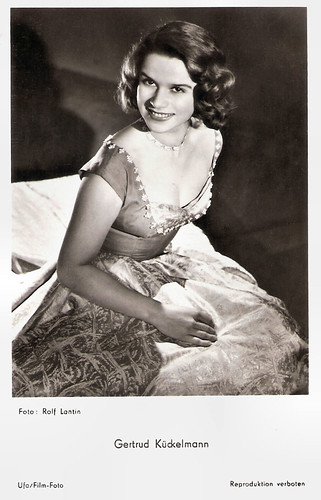
German postcard by Ufa, Berlin-Tempelhof, no. FK 1380. Photo: Rolf Lantin.
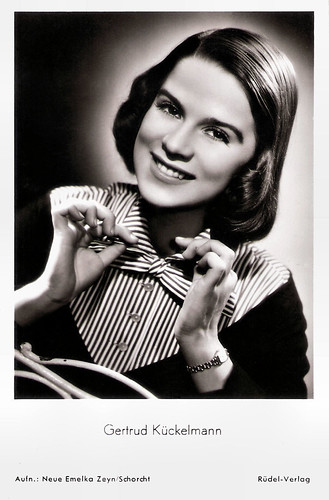
German postcard by F.J. Rüdel, Filmpostkartenverlag, Hamburg-Bergedorf, no. 414. Photo: Neue Emelka / Zeyn / Schorcht. Publicity still for Der Kaplan von San Lorenzo/The Chaplain of San Lorenzo (Gustav Ucicky, 1953).
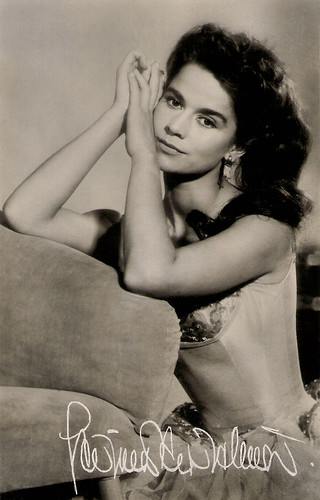
East-German postcard by Progress Film-Verleih, Berlin, no. 225/370, 1957. Photo: DEFA / Kilian. Publicity still for Spielbank-Affäre/Casino Affair (Arthur Pohl, 1957).
Gertrud Christine Franziska Kückelmann was born in 1929 in München (Munich), Germany. Kückelmann was the daughter of the physician Wilhelm Heinrich Ludwig Kückelmann and actress Anna Kückelmann-Guba.
Gertrud spent her school years in Munich and was initially trained as a dancer. At 12, she was a ballet student at the Bavarian State Opera and at 16, she appeared in 'Gestiefelten Kater' (Puss in Boots). She studied singing, began acting classes and in 1949 she signed a long-term contract at the Münchner Kammerspiele.
She made her film debut in the fairytale film Hans im Glück/Hans in Luck (Peter Hamel, 1949) with Gunnar Möller. For her second film role in Rausch einer Nacht/One Night's Intoxication (Eduard von Borsody, 1950), she was awarded the Bundesfilmpreis (German Film Award) as Best Young Actress.
After that, she was typecast in roles of ‘fragile girls’, and was hardly offered different parts. One of her better films was the comedy Musik bei Nacht/Music By Night (Kurt Hoffmann, 1953) with Paul Hubschmid and Curd Jürgens.
In 1956 she appeared in Frucht ohne Liebe/Fruit Without Love (Ulrich Erfurth, 1956), a Problemfilm (a melodrama with a social problem) on the subject of artificial insemination. The film caused quite a scandal in Germany when it premiered. The churches protested against the film and Kückelmann was also criticised.
When new film roles failed to materialise in West Germany, she made a film for the East German DEFA studio: Spielbank-Affäre/Casino Affair (Arthur Pohl, 1957) with Jan Hendriks. It would be her last film for a long time.
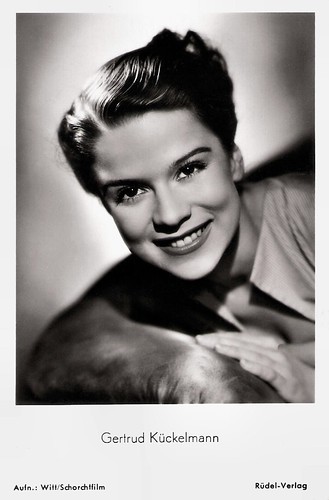
German postcard by Rüdel-Verlag, Hamburg-Bergedorf, no. 564. Photo: Witt / Schorchtfilm. Publicity still for Ei Herz spielt falsch/A Heart's Foul Play (Rudolf Jugert, 1953).
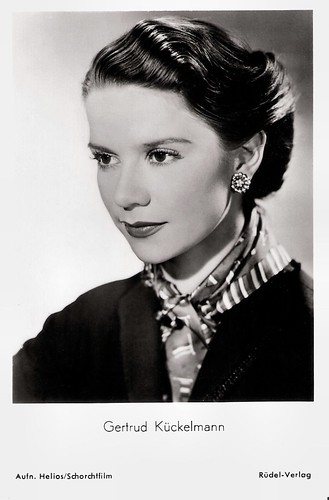
German postcard by Rüdel-Verlag, Hamburg-Bergedorf, no. 626. Photo: Helios / Schorchtfilm. Publicity still for Musik bei Nacht/Music By Night (Kurt Hoffmann, 1953).
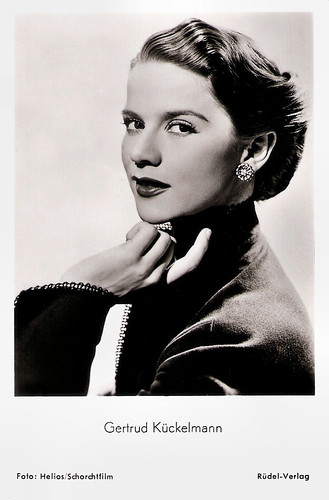
German postcard by Rüdel-Verlag, Hamburg-Bergedorf, no. 673. Photo: Helios / Schorchtfilm. Publicity still for Musik bei Nacht/Music By Night (Kurt Hoffmann, 1953).
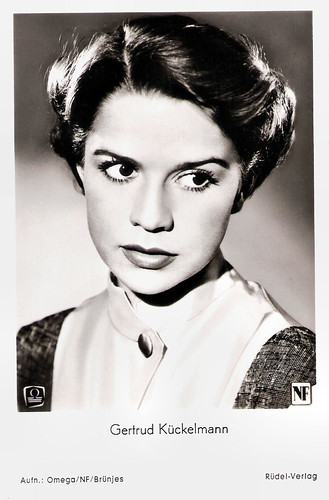
German postcard by Rüdel-Verlag, Hamburg-Bergedorf, no. 1129. Photo: Omega / NF / Brünjes. Publicity still for Der Engel mit dem Flammenschwert/The Angel with the Flaming Sword (Gerhard Lamprecht, 1954).
Gertrud Kückelmann had a longtime love affair with the actor Oskar Werner. They had met at the set of the Austrian film Mozart (Karl Hartl, 1955) in which Werner starred as the composer and Kückelmann played his wife Constanze. The two often worked together.
Kückelmann also worked as a voice actress. She was the German voice of Shirley MacLaine in The Apartment (Billy Wilder, 1960) and The Children's Hour (William Wyler, 1961), of Jane Fonda in A Doll's House (Joseph Losey, 1969), and Charlotte Rampling in The Damned (Luchino Visconti, 1969).
She also appeared in about 100 radio plays and read some fairy tale recordings. In 1968 she married television director Fritz Schuster, but the marriage ended in a divorce in 1971. In 1969, her contract with the Münchner Kammerspiele was ended and in 1970 Kückelmann worked for several months as a nurse.
In 1975 she returned to the cinema in the film Die Angst ist ein zweiter Schatten/Fear Is a Second Shadow, directed by her brother Norbert Kückelmann. It was her final feature film. However, she took part in several television productions and till the end of her life Kückelmann performed on stage. She gave numerous guest performances throughout the German-speaking countries. She both played in classic and modern plays.
Even after surgery for cancer in 1978, she returned once again to the theatre. Her last engagement was at the Berner Stadttheater, but then she was already too ill to perform. In 1979, Gertrud Kückelmann jumped out of a window of the apartment of her brother in Munich. She was 50.
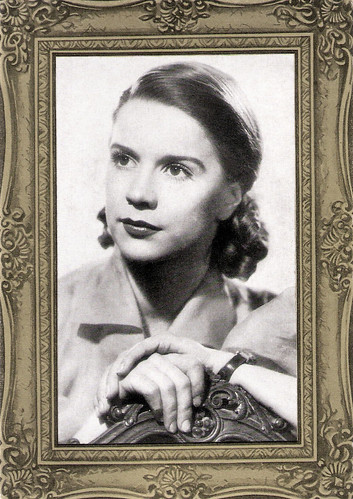
German leaflet. This leaflet contains three pictures and three pages with info on Kückelman and her films.
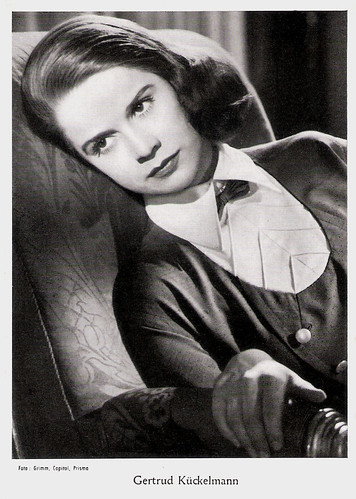
German leaflet. This leaflet contains three pictures and three pages with info on Kückelmann and her films. Photo: Grimm / Capitol / Prisma.
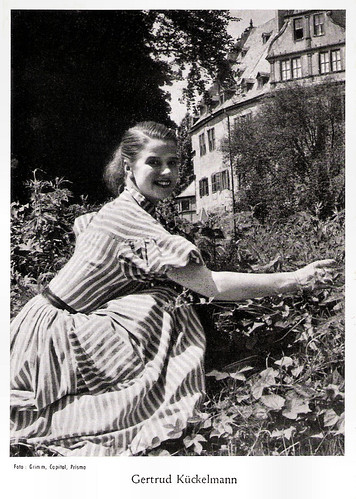
German leaflet. This leaflet contains three pictures and three pages with info on Kückelmann and her films. Photo: Grimm / Capitol / Prisma.

East-German postcard by VEB DEFA-Studio für Spielfilme, Potsdam-Babelsberg, no. 78, 1957, retail price: 0,15 DM. Photo: DEFA / Kilian. Publicity still for Spielbank-Affäre/Casino Affair (Arthur Pohl, 1957) with Jan Hendriks.

East-German postcard by VEB DEFA-Studio für Spielfilme, Potsdam-Babelsberg, no. 78, 1957, retail price: 0,15 DM. Photo: DEFA / Kilian. Publicity still for Spielbank-Affäre/Casino Affair (Arthur Pohl, 1957) with Jan Hendriks.
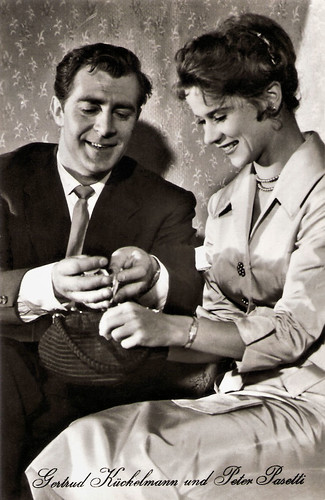
East-German postcard by VEB Progress Filmvertrieb, no. 17/279, 1957. Photo: DEFA / Kilian. Publicity still for Spielbank-Affäre/Casino Affair (Arthur Pohl, 1957) with Peter Pasetti.
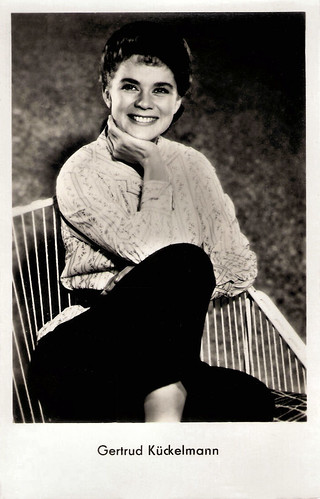
East-German postcard by VEB Progress Filmvertrieb, Berlin, no. 213/236, 1956. Photo: DEFA / Kilian. Publicity still for Spielbank-Affäre/Casino Affair (Arthur Pohl, 1957).
Sources: Luise F. Pusch (FemBio – German), Otto Striebel (Gertrud Kückelmann Gedenkseite – German), Wikipedia (German) and IMDb.
This post was last updated on 31 January 2025.

German postcard by Kunst und Bild, Berlin, no. A 798. Photo: Capitol Film / Prisma / Arthur Grimm. Publicity still for Die Stärkere/The Stronger (Wolfgang Liebeneiner, 1953).

German postcard by Ufa, Berlin-Tempelhof, no. FK 1380. Photo: Rolf Lantin.

German postcard by F.J. Rüdel, Filmpostkartenverlag, Hamburg-Bergedorf, no. 414. Photo: Neue Emelka / Zeyn / Schorcht. Publicity still for Der Kaplan von San Lorenzo/The Chaplain of San Lorenzo (Gustav Ucicky, 1953).

East-German postcard by Progress Film-Verleih, Berlin, no. 225/370, 1957. Photo: DEFA / Kilian. Publicity still for Spielbank-Affäre/Casino Affair (Arthur Pohl, 1957).
Fruit without love
Gertrud Christine Franziska Kückelmann was born in 1929 in München (Munich), Germany. Kückelmann was the daughter of the physician Wilhelm Heinrich Ludwig Kückelmann and actress Anna Kückelmann-Guba.
Gertrud spent her school years in Munich and was initially trained as a dancer. At 12, she was a ballet student at the Bavarian State Opera and at 16, she appeared in 'Gestiefelten Kater' (Puss in Boots). She studied singing, began acting classes and in 1949 she signed a long-term contract at the Münchner Kammerspiele.
She made her film debut in the fairytale film Hans im Glück/Hans in Luck (Peter Hamel, 1949) with Gunnar Möller. For her second film role in Rausch einer Nacht/One Night's Intoxication (Eduard von Borsody, 1950), she was awarded the Bundesfilmpreis (German Film Award) as Best Young Actress.
After that, she was typecast in roles of ‘fragile girls’, and was hardly offered different parts. One of her better films was the comedy Musik bei Nacht/Music By Night (Kurt Hoffmann, 1953) with Paul Hubschmid and Curd Jürgens.
In 1956 she appeared in Frucht ohne Liebe/Fruit Without Love (Ulrich Erfurth, 1956), a Problemfilm (a melodrama with a social problem) on the subject of artificial insemination. The film caused quite a scandal in Germany when it premiered. The churches protested against the film and Kückelmann was also criticised.
When new film roles failed to materialise in West Germany, she made a film for the East German DEFA studio: Spielbank-Affäre/Casino Affair (Arthur Pohl, 1957) with Jan Hendriks. It would be her last film for a long time.

German postcard by Rüdel-Verlag, Hamburg-Bergedorf, no. 564. Photo: Witt / Schorchtfilm. Publicity still for Ei Herz spielt falsch/A Heart's Foul Play (Rudolf Jugert, 1953).

German postcard by Rüdel-Verlag, Hamburg-Bergedorf, no. 626. Photo: Helios / Schorchtfilm. Publicity still for Musik bei Nacht/Music By Night (Kurt Hoffmann, 1953).

German postcard by Rüdel-Verlag, Hamburg-Bergedorf, no. 673. Photo: Helios / Schorchtfilm. Publicity still for Musik bei Nacht/Music By Night (Kurt Hoffmann, 1953).

German postcard by Rüdel-Verlag, Hamburg-Bergedorf, no. 1129. Photo: Omega / NF / Brünjes. Publicity still for Der Engel mit dem Flammenschwert/The Angel with the Flaming Sword (Gerhard Lamprecht, 1954).
Longtime love affair
Gertrud Kückelmann had a longtime love affair with the actor Oskar Werner. They had met at the set of the Austrian film Mozart (Karl Hartl, 1955) in which Werner starred as the composer and Kückelmann played his wife Constanze. The two often worked together.
Kückelmann also worked as a voice actress. She was the German voice of Shirley MacLaine in The Apartment (Billy Wilder, 1960) and The Children's Hour (William Wyler, 1961), of Jane Fonda in A Doll's House (Joseph Losey, 1969), and Charlotte Rampling in The Damned (Luchino Visconti, 1969).
She also appeared in about 100 radio plays and read some fairy tale recordings. In 1968 she married television director Fritz Schuster, but the marriage ended in a divorce in 1971. In 1969, her contract with the Münchner Kammerspiele was ended and in 1970 Kückelmann worked for several months as a nurse.
In 1975 she returned to the cinema in the film Die Angst ist ein zweiter Schatten/Fear Is a Second Shadow, directed by her brother Norbert Kückelmann. It was her final feature film. However, she took part in several television productions and till the end of her life Kückelmann performed on stage. She gave numerous guest performances throughout the German-speaking countries. She both played in classic and modern plays.
Even after surgery for cancer in 1978, she returned once again to the theatre. Her last engagement was at the Berner Stadttheater, but then she was already too ill to perform. In 1979, Gertrud Kückelmann jumped out of a window of the apartment of her brother in Munich. She was 50.

German leaflet. This leaflet contains three pictures and three pages with info on Kückelman and her films.

German leaflet. This leaflet contains three pictures and three pages with info on Kückelmann and her films. Photo: Grimm / Capitol / Prisma.

German leaflet. This leaflet contains three pictures and three pages with info on Kückelmann and her films. Photo: Grimm / Capitol / Prisma.

East-German postcard by VEB DEFA-Studio für Spielfilme, Potsdam-Babelsberg, no. 78, 1957, retail price: 0,15 DM. Photo: DEFA / Kilian. Publicity still for Spielbank-Affäre/Casino Affair (Arthur Pohl, 1957) with Jan Hendriks.

East-German postcard by VEB DEFA-Studio für Spielfilme, Potsdam-Babelsberg, no. 78, 1957, retail price: 0,15 DM. Photo: DEFA / Kilian. Publicity still for Spielbank-Affäre/Casino Affair (Arthur Pohl, 1957) with Jan Hendriks.

East-German postcard by VEB Progress Filmvertrieb, no. 17/279, 1957. Photo: DEFA / Kilian. Publicity still for Spielbank-Affäre/Casino Affair (Arthur Pohl, 1957) with Peter Pasetti.

East-German postcard by VEB Progress Filmvertrieb, Berlin, no. 213/236, 1956. Photo: DEFA / Kilian. Publicity still for Spielbank-Affäre/Casino Affair (Arthur Pohl, 1957).
Sources: Luise F. Pusch (FemBio – German), Otto Striebel (Gertrud Kückelmann Gedenkseite – German), Wikipedia (German) and IMDb.
This post was last updated on 31 January 2025.
No comments:
Post a Comment